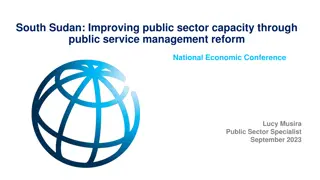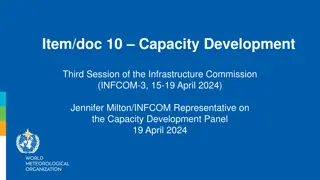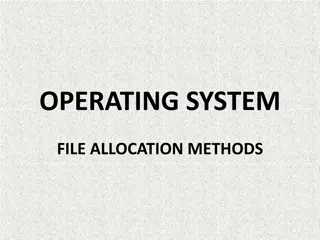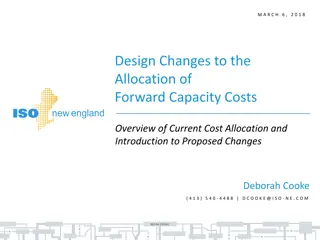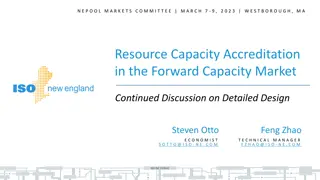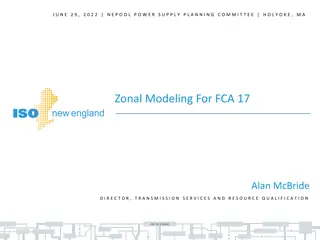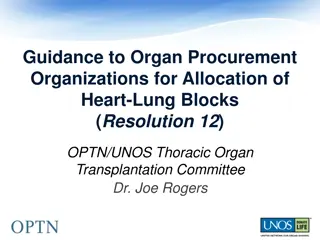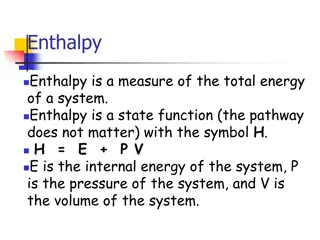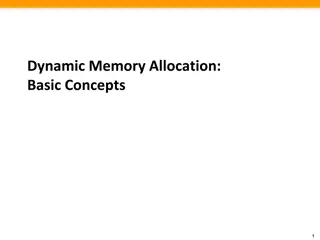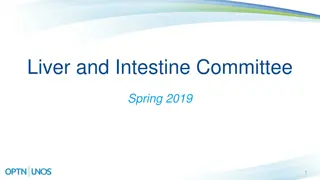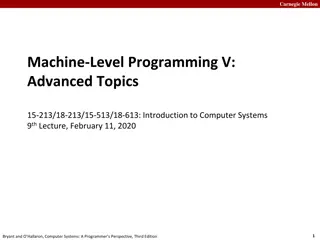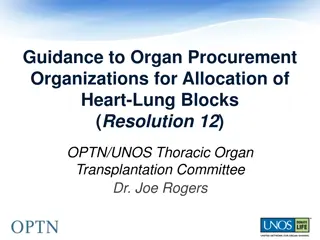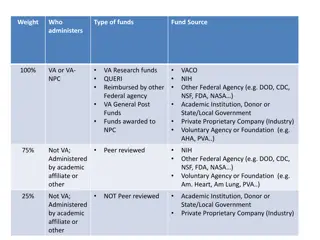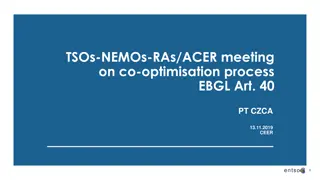Java Allocation and C2
Java object allocation and escape analysis play crucial roles in memory management and performance optimization within the Java Virtual Machine (JVM). This comprehensive overview covers topics such as object vs. scalar allocation, object allocation mechanisms, hotspot escape analysis, ideal and conn
2 views • 22 slides
Enhancing Public Sector Capacity Through Service Management Reform
South Sudan is working on improving public sector capacity through service management reform, focusing on institutionalizing capacity building, pay and grading, pension support, and strengthening the center of government. Lessons from capacity injection mechanisms and policy frameworks are guiding t
0 views • 16 slides
INFCOM Capacity Development Initiatives Overview
INFCOM's capacity development initiatives focus on enhancing Earth system observations, closing capacity gaps on weather services, and supporting new opportunities in competencies and capabilities. Collaboration and coordination mechanisms have been established to facilitate sharing of information a
0 views • 11 slides
Advancements in Chemical Mechanisms for Air Quality Management
Daniel Jacob and team have been enhancing chemical mechanisms in the GEOS-Chem model to support US air quality management. Ongoing work includes developing new mechanisms for aromatic VOCs, tropospheric halogens, mercury redox, adaptive mechanism reduction, machine learning applications, and unifica
0 views • 19 slides
Understanding File Allocation Strategies in Operating Systems
Explore various file allocation schemes like extent-based systems, linked allocation, file allocation table (FAT), indexed allocation, and combined schemes used in operating systems. Learn about their pros and cons, including details on maximum file size calculations based on disk block sizes and po
0 views • 20 slides
Operating System: File Allocation Methods
File allocation methods in operating systems determine how files are stored in disk blocks. The main methods include Contiguous Allocation, Linked Allocation, and Indexed Allocation. Contiguous Allocation involves allocating blocks in a contiguous manner for efficient disk space utilization and fast
0 views • 14 slides
Proposed Changes to Forward Capacity Cost Allocation
The document discusses proposed changes to the allocation of forward capacity costs effective June 1, 2020. It highlights the need for transparency in cost allocation, focusing on zonal demand curves and the Marginal-Reliability Impact. The current opaque method is critiqued for potential non-intuit
0 views • 47 slides
Resource Capacity Accreditation in Forward Capacity Market Overview
Resource Capacity Accreditation project aims to enhance ISO-NE's accreditation processes in the Forward Capacity Market, supporting a reliable, clean-energy transition. Key concepts covered in this educational presentation include accreditation space, methods, benefits, challenges, and improvement o
1 views • 53 slides
Resource Capacity Accreditation in the Forward Capacity Market Discussion
The presentation discusses improvements in the Resource Capacity Accreditation project of ISO-NE's Forward Capacity Market to support a reliable, clean-energy transition. It includes details on seasonal components, reconfiguration auctions, trading obligations, and stakeholder schedules. Examples pr
3 views • 71 slides
Capacity Zone Modeling for Forward Capacity Auction 17 Results
This presentation unveils the Capacity Zone modeling calculations for Forward Capacity Auction 17 associated with the 2026-2027 Capacity Commitment Period by ISO-NE PUBLIC. It delves into boundary definitions, import-constrained zone modeling, and market rules guiding the assessments and modeling pr
0 views • 16 slides
Designing 9-Bit RU Allocation Subfield for EHT Trigger Frame in IEEE 802.11-20
IEEE 802.11-20/1845r2 presents a proposal for enhancing the RU allocation subfield design in the EHT Trigger frame to accommodate bandwidth support up to 320MHz and multiple RU or MRU allocations for UL MU transmissions in the 11be standard. The modification addresses inconsistencies in MRU mapping
0 views • 34 slides
Proposal for Resource Capacity Accreditation in Forward Capacity Market
The ISO-NE has proposed improvements to the accreditation processes in the Forward Capacity Market (FCM) through the Resource Capacity Accreditation (RCA) project. The aim is to enhance the accreditation of resource contributions to ensure reliability during the transition to a cleaner energy mix. T
0 views • 59 slides
Risk Allocation for Allocation Wells in Energy Law
Definition of allocation wells in energy law, advantages and disadvantages, lessees' rights, allocation of production to mineral owners, and legal cases related to pooling agreements. The content discusses various aspects of risk allocation for unagreed horizontal wells and the importance of clear a
0 views • 16 slides
Resource Capacity Accreditation in the Forward Capacity Market: Continued Discussion and Detailed Design
The Resource Capacity Accreditation (RCA) project by ISO-NE aims to enhance accreditation processes in the Forward Capacity Market (FCM) to support a reliable, clean-energy transition. This presentation focuses on seasonal components of Capacity Supply Obligations (CSO), Pay-for-Performance (PFP) ob
0 views • 58 slides
Spatial Stream Allocation in IEEE 802.11-20 Trigger Frames
The document discusses spatial stream allocation in IEEE 802.11-20 trigger frames, specifically focusing on the SS Allocation subfield. It explains how trigger frames allocate resources for TB PPDU transmissions and solicit User Info fields, detailing the RU Allocation and SS Allocation subfields. T
3 views • 15 slides
Understanding Self-Neglect, Hoarding, and the Mental Capacity Act (2005)
Self-neglect and hoarding are complex issues often intertwined with mental capacity challenges. The Mental Capacity Act (2005) outlines capacity assessments, decision-making criteria, and challenges faced by professionals in safeguarding individuals. Recognizing the need for trauma-informed care in
1 views • 16 slides
Understanding Legal and Mental Capacity in Healthcare Decisions
Clinical specialist occupational therapist, Louise Lawlor, advocates for patients' rights and decision-making capacity in healthcare settings. She emphasizes the importance of legal and mental capacity in making informed decisions, highlighting relevant legislation, guidance documents, and a functio
0 views • 24 slides
Enhancing Heart-Lung Allocation Policy for Organ Transplantation
This project focuses on improving the allocation of heart-lung blocks for organ transplantation by providing clear guidelines to Organ Procurement Organizations (OPOs). The goal is to ensure consistent practices among OPOs across the country, promoting fairness and efficiency in organ allocation. Th
0 views • 11 slides
Exploring Capacity and Volume in Practical Settings
Explore the concepts of volume and capacity through engaging activities involving measuring liquid in containers, understanding units like milliliters and liters, and solving capacity-related questions. Discover how to work out different measurements and practice practical capacity in the kitchen wi
0 views • 7 slides
Understanding Enthalpy and Heat Capacity in Chemistry
Enthalpy is a measure of total energy in a system, represented as H = E + P.V. Heat at constant pressure relates to enthalpy changes. Calorimetry and heat capacity help measure and understand heat in chemical reactions. Specific heat capacity and molar heat capacity play key roles in determining ene
0 views • 16 slides
Understanding Dynamic Memory Allocation in Programming
Dynamic memory allocation is a crucial concept in programming where programmers use allocators like malloc to acquire memory at runtime for data structures. This process involves managing the heap, maintaining variable-sized blocks, and utilizing functions like malloc, free, calloc, realloc, and sbr
0 views • 33 slides
Workshop on New Approaches to Statistical Capacity Development in Lao PDR
This workshop, hosted by PARIS21 and UNDP, focuses on enhancing statistical capacity development in Lao PDR. It covers topics like successful capacity development programs, partnerships for national statistics development, and prioritizing needs versus international requirements. The Lao Statistics
0 views • 15 slides
Proposed Changes in Capacity Reports for Implicit Auctions
A proposal for new reporting requirements related to offered capacity in implicit auctions, focusing on identifying interconnector trading opportunities in specific trading periods. The report aims to provide crucial data such as minimum IUN allocation, import/export offered capacity, ATC values, an
0 views • 12 slides
Update in Liver and Intestine Allocation Policies for Spring 2019
The recent updates in liver and intestine allocation policies for Spring 2019 include eliminating region and DSA from the allocation model, prioritizing medical urgency and proximity, enhancing pediatric candidate considerations, and adjusting weights for DCD and elderly donors. Acuity Circles Alloc
0 views • 15 slides
Changes in Capacity Allocation Regulations for Gas Infrastructures in Portugal
The new regulation in Portugal brings significant changes in capacity booking and trading to promote convergence with CAM NC and enable a secondary market. Major changes include ex-ante payment of capacity rights, capacity allocation via a booking platform, and enhancement of liquidity in the second
0 views • 13 slides
Understanding Memory Layout and Allocation in Computer Systems at Carnegie Mellon University
Exploring the memory layout and allocation in computer systems through lectures at Carnegie Mellon University, focusing on topics such as buffer overflow vulnerability protection, unions, shared libraries, stack, heap, data locations, addresses, and practical memory allocation examples. The content
1 views • 55 slides
The Assisted Decision-Making (Capacity) Act 2015 in the Criminal Justice Context
The Assisted Decision-Making (Capacity) Act 2015 introduces key reforms such as the abolition of wards of court system for adults, a statutory functional test of capacity, new guiding principles, a three-tier framework for support, and tools for advance planning. It emphasizes functional assessment
0 views • 17 slides
Effective Allocation Strategies for Decision-Making
Explore various allocation strategies such as Majority Rule, Random Selection, Authority, and Competition through a scenario of deciding who gets the candy. Analyze the efficiency and fairness of each strategy, consider the balance between economic efficiency and equity, and envision potential impac
0 views • 8 slides
Optimization of Heart-Lung Allocation Policy for Organ Procurement Organizations (OPOs)
This document provides guidance to Organ Procurement Organizations (OPOs) regarding the allocation of heart-lung blocks, focusing on resolving issues related to Policy 6.5.E. The aim is to establish clear policies and principles to ensure consistent allocation practices among OPOs nationwide. Throug
0 views • 11 slides
The System for Transparent Allocation of Resources (STAR) Overview
STAR is a framework implemented by GEF to allocate resources among biodiversity, climate change, and land degradation focal areas. It updates the Resource Allocation Framework to maximize impact, promote environmental policies, and meet country priorities through a structured allocation process. The
0 views • 26 slides
E-GRANT: Resource Allocation Tool Features and Development
E-GRANT is an advanced resource allocation tool developed by EGI-Engage for efficiently managing resources allocation for projects related to computing, storage, and VMs. The tool allows customers to send requests, negotiate resources, sign SLAs, and view allocations. It also enables resources provi
0 views • 5 slides
Challenges of Flow Rate Fairness in Network Resource Allocation
Addressing the concept of flow rate fairness in network resource allocation, this content explores its limitations and challenges. Despite being a goal in protocols like TCP, the practicality and enforceability of flow rate fairness are questioned. It highlights the inadequacy of flow rate as a meas
0 views • 15 slides
Soft Resource Allocation in N-Tier Application Scalability
This research paper explores the impact of soft resource allocation on n-tier application scalability, discussing topics such as over-allocation, under-allocation, bottleneck issues, and proposing a practical algorithm for effective resource allocation. It also covers the performance implications in
0 views • 36 slides
Understanding VERA Research Funding Allocation Process
The VERA (Veterans Equitable Resource Allocation) system determines the distribution of research funds within the VA. VAMCs report their expenditures, which are weighted and summed to calculate a national price. This price is used to allocate funds to individual sites. VERA dollars are distributed t
0 views • 7 slides
Understanding Biomarkers and Toxicity Mechanisms: Overview of Mechanisms in Targeting Biological Macromolecules
This overview delves into different categorizations of mechanisms of action (MoA) based on target molecules, interaction types, and steric specificity. It explores non-specific and specific mechanisms, along with possible categorizations involving membrane toxicity, reactive toxicity, and species-sp
0 views • 8 slides
Capacity Allocation Mechanisms (CAM) Business Rules Workshop Summary
This summary provides insights into the Capacity Allocation Mechanisms (CAM) Business Rules Workshop held at Ashling Hotel, Dublin on July 2, 2014. The workshop covered topics such as CAM business rules scope, key features, auction processes, code modifications, implementation timelines, and consult
0 views • 32 slides
Understanding Coping Skills and Defense Mechanisms
Coping mechanisms and defense mechanisms are strategies individuals use to manage stress and emotions. Coping mechanisms help people adjust to difficult events while maintaining emotional well-being, whereas defense mechanisms operate at an unconscious level and can change internal psychological sta
0 views • 18 slides
Defense Mechanisms in Psychology: Understanding Repression, Displacement, Intellectualization, Rationalization
Defense mechanisms play a crucial role in how individuals cope with stress and anxiety. This text delves into key defense mechanisms such as repression, displacement, intellectualization, and rationalization. These mechanisms help individuals manage unacceptable thoughts, feelings, and impulses by r
0 views • 11 slides
Co-optimisation Process for Cross-Zonal Capacity Allocation
The meeting discussed the co-optimisation process for cross-zonal capacity allocation outlined in Article 40. It includes developing a methodology for the allocation process, feedback from public consultation, and a timeline for implementation. Stakeholders raised concerns regarding co-optimization
0 views • 10 slides
Effective Asset Allocation Strategies for Investment Success
Investment professionals emphasize the critical importance of the asset allocation decision in shaping investor outcomes. Strategic Asset Allocation (SAA) focuses on long-term goals, while Tactical Asset Allocation (TAA) addresses short-term objectives. Proper navigation through economic cycles invo
0 views • 18 slides

